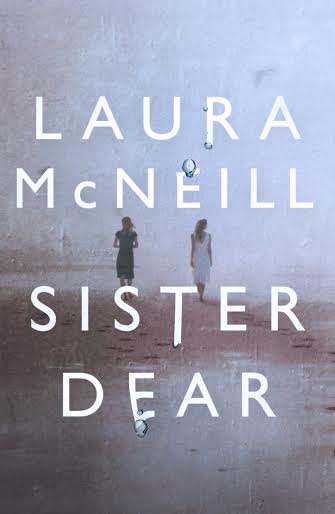
A Domestic Suspense To Die For! Well, if that doesn’t grab you, I’m sure the excerpt will.
Come on in and check out Sister Dear by Laura McNeill.
~~~
Title: Sister Dear
Author: Laura McNeill
Publisher: HarperCollins/Thomas Nelson
Pages: 336
Genre: Domestic Suspense
Synopsis
All Allie Marshall wants is a fresh start. But when dark secrets refuse to stay buried, will her chance at a new life be shattered forever?
Convicted of a crime she didn’t commit, Allie watched a decade of her life vanish. Now, out on parole, Allie is determined to clear her name and reconnect with the daughter she barely knows.
But Allie’s return to Brunswick, Georgia, sends earthquakes through the small, coastal community. Even her daughter Caroline, now a teenager, challenges Allie’s claims of innocence.
Refusing defeat, a stronger, smarter Allie launches a campaign for the truth, digging deep into the past. Her investigation threatens her parole status, her own safety, and the already-fragile bond with her family. What Allie uncovers is far worse than she imagined. Her own sister has been hiding a dark secret—one that holds the key to Allie’s freedom.
For More Information
- Sister Dear is available at Amazon.
- Pick up your copy at Barnes & Noble.
Discuss this book at PUYB Virtual Book Club at Goodreads
~~~~~
Book Excerpt:
In her final minutes as an inmate at Arrendale State Prison, Allie Marshall’s body pulsed with tension. Eyes averted, managing any movements with robotic precision, she remained on guard.
Only moments to go.
A sliver of time. Not even a quarter hour. An unremarkable measurement, when held up against the billion other moments in any person’s natural life. But after a decade inside, those last twelve minutes seemed the longest span in all of eternity.
To her right, rows of monitors blinked and recorded everything across the sprawling campus in Habersham County. Though the angles differed, the subject never changed: women in identical tan-collared shirts and shapeless pants. Inmates on work detail, in the cafeteria, in dormitories.
A corrections officer sat nearby, her pale-blue eyes scanning the screens. To this worker, to all of them, Allie was GDC ID, followed by ten numbers. Nothing more. Inside the thick metal bars, Allie’s life was suspended, a delicate fossil in amber.
Until now. Ten more minutes.
Her reflection stared back, unblinking, in the shatterproof glass window near the door. Green eyes flecked with gold, dark-blonde hair tucked in a loose ponytail, barely visible brackets at the corners of her lips.
Maybe, Allie thought, she’d forgotten how to smile and laugh. Happiness seemed unreachable, as if the feeling itself existed on the summit of an ice-tipped mountain shrouded by storm clouds. Indeed, the rush of pure, unadulterated joy belonged only to those with freedom. Allie’s memories of it—her daughter’s birth, Caroline’s first smile, first steps—were fleeting and distant.
Instead, the perpetual motion of prison, the waking, sleeping, and sameness, all blended together, like a silent black-and-white movie on a continuous loop.
Until the news of her parole.
At first, the concept of liberty seemed impossible—a hand trying to catch and hold vapor. The judge had sentenced Allie to sixteen years, and she fully anticipated serving each and every one of them. She didn’t believe she’d be granted an early release—she couldn’t—until she stepped beyond the walls and barbed wire and chain-link fence, barriers that kept her from everyone and everything she’d ever loved.
Allie focused on breathing, stretching her lungs, exhaling to slow her pulse. Her own belongings, a decade old, lay nearby. Keys that wouldn’t open doors. A watch with a dead battery. A light khaki jacket with a photo of then five-year-old Caroline tucked in the pocket, one pair of broken-in Levis, and a white cotton shirt. Gingerly, with her fingertips, she reached for the clothing, then gripped the bundle tight to her chest.
A second guard motioned for Allie to change quickly in a holding room. With the door shut, she pulled the shapeless prison garb over her head and picked up the shirt. The material, cool and light, brushed against her skin like gauze. Allie shivered.
For ten years, all she’d known was the rasp of her standard-issue navy jacket, the scrape of her worn white tennis shoes along the sidewalk.
Back in Brunswick, Allie had filled her closet with easy summer shifts and crisp linen pants. Now her body was different too—the soft curves had dissolved, leaving lean muscle behind. The jeans hung loosely around her waist and hips. The top billowed out in waves from her shoulders.
Nothing would fit, she reminded herself. Not much in her past life would.
And that was all right.
When she walked out of Lee Arrendale State Prison, home to thousands of female inmates, Allie didn’t want reminders. No indigo tattoo inked down her back or neck. No numbers or symbols etched into her arms or fingers. The only external validation of time served was a faint scar that traced her eyebrow.
The real proof of her internment lay underneath it all. Below the seashell white of Allie’s skin, hidden in blood, tendons, and muscle, the experience indelibly marked on her soul. An imprint made by incident, mistake, and tragedy.
Evidence, and lack of it.
“I’m innocent,” she’d insisted to everyone who would listen. Her lawyers fought hard, rallied a few times, but in the end, the jury convicted her. Voluntary manslaughter.
A year later, Allie’s appeal failed. Then money ran out. Her father turned his attention back to his veterinary practice after his cardiologist warned the stress of another trial might kill him. Her mother did her best to minimize worry while Emma, her tempestuous and fun-loving sister, assumed the role of doting aunt and guardian to Caroline.
And there was Ben. Sweet, thoughtful Ben. The man who’d wanted to marry her, who said he would love her always. Even after her arrest, he’d promised to wait for her if the worst happened. Allie couldn’t live with herself if he’d sacrificed everything—his rising political career, his reputation, and his life for a decade or more. She’d broken it off, knowing it would wound him terribly. When he’d finally left, when she saw him for the last time, it was as if the very core of her being had been torn away, leaving a vast, gaping emptiness she couldn’t fill, despite how hard she tried. Allie closed her eyes. She’s convinced herself it was the logical thing, what made sense. She had done her best to forget him. It hadn’t worked in the least.
The days and months blurred. Entire seasons dissolved, shapeless and gray, like the ink of fine calligraphy smeared by the rain.
The squawk of the prison intercom barely registered in Allie’s brain. Sharp insults and threats were routine, eruptions of violence expected. Even along the brown scrub grass and wooden benches of the prison yard, there was no escape. Allie always tried to disappear—pressing her body close to the concrete walls, becoming a chameleon against the barren landscape.
The women in Arrendale weren’t afraid of punishment; most had nothing left. Some bonded with other inmates for favors; others paid for protection with cigarettes, food, and stamps. For those prisoners who had lost everything; inmates with little hope of parole, life was almost unthinkable.
Clutching her hands in her lap to keep from shaking, Allie watched as a woman collapsed in the cafeteria, stabbed in the jugular with a plastic fork. The next week, a fellow inmate in her dormitory was choked to death, purple fingerprints visible on the woman’s throat when the guards discovered her body. Allie was haunted with grief for weeks after a young girl, only four years older than Caroline, tried to hang herself with a scrap of fabric.
Despite it all, despite the desperation that seemed to permeate the very air she breathed, Allie had survived.
In another few minutes, her younger sister, Emma, would arrive, as bus service didn’t run from Alto to Brunswick. Tomorrow she’d meet her parole officer at noon. And like every parolee, she would receive a check, courtesy of the Georgia Department of Corrections, enough to buy shampoo, a bar of soap, and a comb for her hair.
Allie blinked up at the clock, almost afraid the time might start going backward. She forced her eyes away, squeezed them shut. If she tried hard enough, her mind formed a picture of her grown daughter’s face. In her daydreams, she’d imagined their reunion a million times, rehearsed every possible scenario. She worried about the right words to say, how to act, and whether it was all right to cry. The enormity of it was impossible to contain, like holding back the ocean with a single fingertip.
All that mattered now was seeing Caroline.
The buzzer sounded long and loud; its vibration shook the floor. The burly guard sighed and lumbered to her boot-clad feet. She stood inches from Allie’s shoulder, her breath hot and rank from a half-eaten roast beef sandwich.
Locks clicked and keys rattled. The barrier, with its heavy bars, groaned under its own weight. An inch at a time, the metal gate heaved open. Soon, there would be nothing but empty space standing between Allie and the rest of the world.
She felt a nudge.
In that moment, Allie heard four words, precious and sweet.
“You’re free to go.”
~~~~~
Author Laura McNeil

Laura McNeil is a writer, mom, travel enthusiast, and coffee drinker. In her former life, she was a television news anchor for CBS News affiliates in New York and Alabama. Laura holds a master’s degree in journalism from The Ohio State University and is completing a Ph.D. in Instructional Leadership at the University of Alabama. When she’s not writing and doing homework, she enjoys running, yoga, and spending time at the beach. She lives in Northern Alabama with her family.
Her latest book is the domestic suspense, Sister Dear.
For More Information
- Visit Laura McNeil’s website.
- Connect with Laura on Facebook and Twitter.
- Find out more about Laura at Goodreads.
~~~~~















